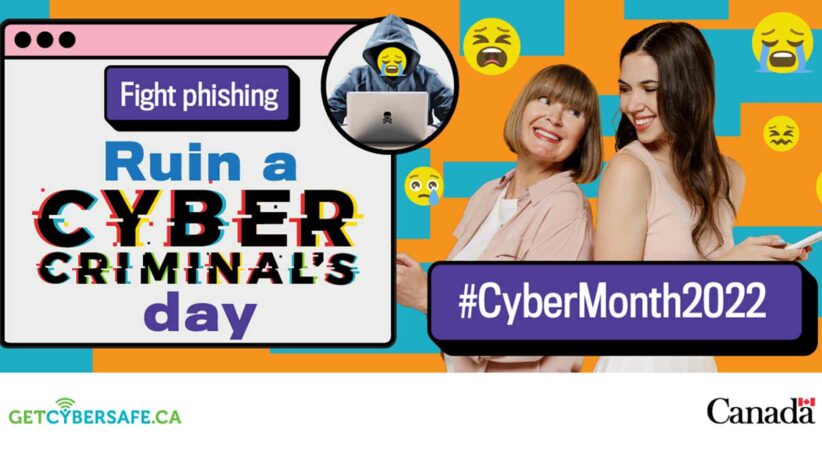
Cyber Security Awareness Month 2022
October is Cyber Security Awareness Month (#CyberMonth2022) and this year’s theme is “Fight phishing: Ruin a cyber criminal’s day!” Read below to learn more about this year’s theme and great resources to support it.
What is phishing?
“Phishing is an attack where a scammer calls you, texts or emails you, or uses social media to trick you into clicking a malicious link, downloading malware, or sharing sensitive information. Phishing attempts are often generic mass messages, but the message appears to be legitimate and from a trusted source (e.g. from a bank, courier company).” – Canadian Centre for Cyber Security
Phishing is one of the most commonly reported frauds in Canada. Two common forms of phishing are “smishing” and “spear phishing.”
- Smishing: Fraudulent text messages designed to induce users to reveal personal or financial information via the mobile phone.
- Spear phishing: Spoof emails to persuade people within an organization to reveal their usernames or passwords. Spear phishing is small-scale and well targeted.
What can you do?
- Check out the free resources in the Government of Canada’s Champions toolkit.
- Take the Canadian Bankers Association’s Cyber Security Awareness Quiz to test your knowledge of the latest phishing scams and tactics.
- Participate in the BC Government’s cyber security challenges.
- Don’t click on links from unsolicited messages.
- Don’t download attachments from unsolicited messages.
- Watch for spelling mistakes.
- Don’t trust a message just because the email address looks legitimate; fraudsters can spoof the address.
- Beware of messages claiming to be from the Government of Canada or a law enforcement agency; they will never contact you to offer funds via email or e-transfer.
The Communications Security Establishment is also back with another catchy and educational Cyber Security Awareness Month video, this time as a sea shanty!
To learn more about phishing and how to avoid being caught in a phishing scam, check out the resources below.
Resources
- Canadian Anti-Fraud Centre: Phishing
- Canadian Consumer Handbook: Phishing
- Communications Security Establishment’s YouTube channel with more helpful phishing videos
- Don’t take the bait: Recognize and avoid phishing attacks
- Get Cyber Safe resources
- National Cybersecurity Alliance (US): Phishing
Related Blog Posts
COR – Learn to think like a fact checker
Students continue to have trouble determining if online information is reliable or fake. A recent study found that two-thirds of students couldn’t tell the difference between news stories and ads …
Digital Literacy 101
Looking for support in teaching students digital literacy skills such as authenticating information, managing privacy, addressing cyberbullying, and being safe online? MediaSmarts has created Digital Literacy 101, a suite of …
iPads for Digital Literacy
Learn about teaching digital literacy with tablets like the iPad.
